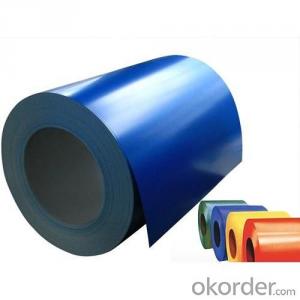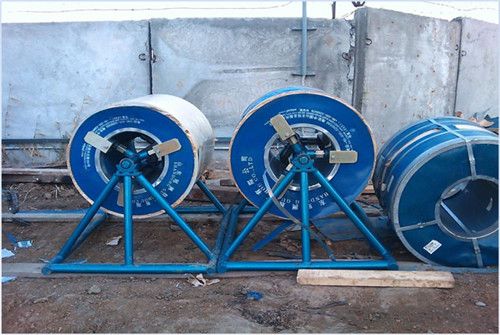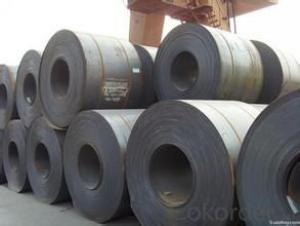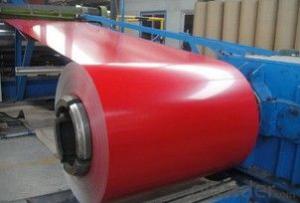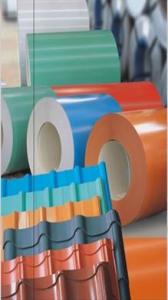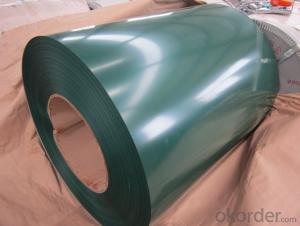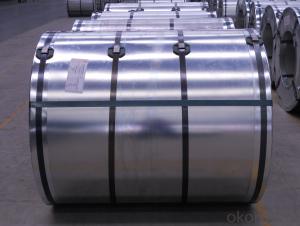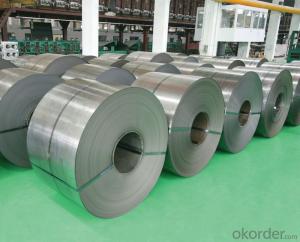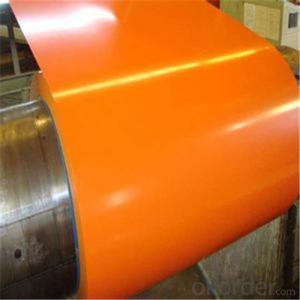Color Coated galvanized Cold rolled Steel Coil
- Loading Port:
- Tianjin
- Payment Terms:
- TT OR LC
- Min Order Qty:
- 25 m.t.
- Supply Capability:
- 30000 m.t./month
OKorder Service Pledge
OKorder Financial Service
You Might Also Like
Product Description:
Pre-painted Galvanized Steel Coils
PPGI and PPGL
1) Standard: JIS G3312 CGCC & CGLCC, equivalent to ASTM A755M, EN10169
2) Grade: CGCC and CGLCC
3) Hardness: Both soft and full hard are available
4) Surface finish: With or without protect film covered
5) Thickness range: 0.16-1.20mm
6) Coil width: 600-1250mm, general 914mm, 1000mm, 1220mm and 1250mm.
7) Shape: Both sheet and coil are available
8) Coating: Z40 to Z275, or AZ30 to AZ150
9) Paint thickness: Top 5 um + (10-20) um polyester, Reverse 5-10 um Epoxy
10) Color: any RAL code, or according to customer's sample
11) Coil weight: 3-6 tons, or according to customer's requirements
12) Max loading in one 20ft container: 25 tons generally
13) MOQ: 25 tons for each thickness or color;
14) Delivery time: 2 weeks or one month generally.
15) Applications: Widely used for roof tiles, outer walls, ovens, explosive-proof steel, electrically
controlled cabinets, and industrial freezers in the residential and industrial buildings.
| NAME | PPGI/PPGL/PPCR | GI | GALVALUME | |
CERTIFICATE | ISO9001:2008 | |||
STANDARD | EN10142 JIS G3302 GB/T-12754-2006 | ASTM A653 JIS G3302 GB/T2518 European Standard | ASTM A792 JIS G3321 JIS G3317 | |
SIZE | (0.12-3.0)*1250MM OR UNDER | |||
TYPE | COILS/SHEET/CORRUGATED | |||
TECHNIQUE | HOT ROLLS-COLD ROLLS-GI OR GL-PPGI/PPGL | |||
SURFACE TREATMENT | MIN/REGULAR/BIG SPANGLE CHROMATED/OILED COATED | |||
APPLICATION | ROOFING,SHUTTER ROLLER DOOR,HOUSE,SANDWICHPANEL ECT | |||
- Q: what is the differance between ceramic and stainless steel headers and 4-2-1 and 4-1 and which are better for racing and should i get ceramic or stainless steel headers???? for a 98 civic
- 4 into 2 into 1 is the style that the pipe finally necks down to one pipe. 4 into 1 is more restrictive but you wont really notice. Ceramic costs alot more but is better at keeping the high temps safe and wont warp or discolor, rust like other pipes, they are for more performance oriented vehicles. Stainless will do the job though for the average tuner.
- Q: How do steel coils contribute to the manufacturing of agricultural machinery?
- Steel coils play a crucial role in the manufacturing of agricultural machinery. These coils are typically made from high-quality steel, which possesses excellent strength, durability, and resistance to corrosion. Firstly, steel coils are used in the fabrication of the main structural components of agricultural machinery, such as the chassis, frames, and supports. These components need to withstand heavy loads, extreme weather conditions, and rough terrains. The strength and resilience of steel coils ensure that the machinery can handle these demanding environments and perform efficiently. Moreover, steel coils are utilized in the production of various moving parts and mechanisms within agricultural machinery. For instance, they are used to create gears, shafts, and axles, which are essential for transmitting power and transforming rotational motion. Steel's high tensile strength and excellent machinability make it an ideal material for these critical components, ensuring their reliability and longevity. Steel coils also contribute to the production of agricultural machinery by providing a protective layer against wear and tear. The coils are often coated with specialized finishes or paints to enhance their resistance to rust, chemicals, and abrasion. This protective layer extends the lifespan of the machinery and reduces the need for frequent maintenance and repairs, ultimately increasing its overall efficiency and productivity. Furthermore, the versatility of steel coils allows for customization and adaptation to meet the specific requirements of agricultural machinery. Manufacturers can shape and form the coils into various sizes and dimensions, enabling the production of machinery suitable for different farming practices and applications. Whether it's tractors, harvesters, or irrigation systems, steel coils are essential in creating versatile and reliable agricultural machinery. In summary, steel coils are indispensable in the manufacturing of agricultural machinery due to their strength, durability, resistance to corrosion, and customization capabilities. From structural components to moving parts and protective coatings, steel coils contribute significantly to the efficiency, reliability, and longevity of agricultural machinery, ultimately supporting the global agricultural industry.
- Q: How are steel coils used in the production of infrastructure materials?
- Steel coils are widely used in the production of infrastructure materials due to their durability, versatility, and strength. These coils are typically made from hot-rolled steel, which is formed into large rolls or coils for easy transportation and handling. One common application of steel coils in infrastructure materials is in the production of steel sheets and plates. These coils can be further processed to create flat sheets of steel, which are then used for various construction purposes. For example, steel sheets are frequently used in the manufacturing of bridges, highways, and buildings as they provide a strong and reliable material that can withstand heavy loads and adverse weather conditions. Another important use of steel coils in infrastructure materials is in the manufacturing of pipes and tubes. Steel coils are often processed into seamless or welded pipes that are utilized in the construction of water and gas pipelines, as well as in the transportation of various liquids and gases. Steel pipes and tubes are preferred in infrastructure projects due to their high strength, corrosion resistance, and ability to withstand high-pressure environments. Furthermore, steel coils are also used in the production of reinforcing bars or rebars, which are integral components in the construction of reinforced concrete structures. These rebars, made from coiled steel, are embedded within concrete to provide tensile strength and enhance the structural integrity of buildings, bridges, and other infrastructure projects. Steel coils allow for efficient production of rebars, ensuring a consistent quality and size for reinforced concrete constructions. In conclusion, steel coils play a crucial role in the production of infrastructure materials. Their use in the manufacturing of steel sheets, pipes, and rebars ensures the durability, strength, and reliability of infrastructure projects. By providing a versatile and robust material, steel coils contribute to the development of safe and long-lasting structures in our built environment.
- Q: Eutectoid Steel
- Eutectic steel is used to produce pearlite, bainite, spheroidite and martensite steels. Those steels vary in strength, hardness and ductility. One uses martensite steel for example in razor blade manufacturing. Of course there is no end to the various uses of these steels.
- Q: What are the different types of steel coil slitting blades?
- There are several different types of steel coil slitting blades, each designed for specific applications and materials. Some of the most common types include: 1. Circular slitting blades: These are the most commonly used blades for slitting steel coils. They are circular in shape and have a sharp edge that cuts through the coil as it rotates. Circular slitting blades can be made from various materials, such as high-speed steel or tungsten carbide, depending on the desired cutting performance and durability. 2. Arbors: Arbors are another type of steel coil slitting blade that is used in conjunction with circular slitting blades. They are cylindrical in shape and hold the circular blade in place, allowing for precise and consistent slitting of the coil. 3. Shear slitting blades: Shear slitting blades are used for cutting thicker and harder materials, such as stainless steel or aluminum. They have a straight edge and work by shearing the material apart, rather than cutting through it like circular blades. Shear slitting blades are typically made from high-quality tool steel to withstand the high forces involved in cutting thicker materials. 4. Crush cut slitting blades: Crush cut blades are used for slitting softer materials, such as paper or plastic. These blades have a blunt edge that crushes and tears the material, rather than cutting it cleanly. Crush cut blades are often made from materials like carbon steel or hardened stainless steel. 5. Razor slitting blades: Razor slitting blades are used for slitting delicate materials that require a clean and precise cut, such as thin films or foils. These blades have an extremely sharp edge that slices through the material without causing any damage or distortion. Razor slitting blades are typically made from high-quality stainless steel or tungsten carbide. It is important to select the appropriate type of steel coil slitting blade based on the specific application, material, and desired cutting performance. The choice of blade will greatly impact the quality and efficiency of the slitting process.
- Q: days. Use your knowledge of the corrosion of steel and aluminum to predict how they would look different after a week exposed to rainy weather. Explain your prediction.
- Steel rusts, aluminum doesn't so the steel can would be rusty and the aluminum can would not.
- Q: What are the applications of stainless steel coils?
- Stainless steel coils have a wide range of applications across various industries due to their unique properties and characteristics. Some of the key applications of stainless steel coils include: 1. Manufacturing industry: Stainless steel coils are extensively used in the manufacturing sector for the production of various products such as automotive parts, kitchen appliances, machinery components, and construction materials. The high corrosion resistance and durability of stainless steel make it an ideal choice for these applications. 2. Construction industry: Stainless steel coils are widely used in the construction industry for applications such as roofing, cladding, structural supports, and reinforcement. The strength, resistance to harsh weather conditions, and aesthetic appeal of stainless steel make it a popular choice in architectural designs. 3. Food processing industry: Stainless steel coils are commonly utilized in the food processing industry for equipment such as food storage tanks, conveyors, and processing machinery. Stainless steel's hygienic properties, resistance to corrosion, and ease of cleaning make it suitable for maintaining the purity and safety of food products. 4. Chemical industry: Stainless steel coils find extensive usage in the chemical industry due to their excellent resistance to corrosion from chemicals and harsh environments. They are used in the production of storage tanks, pipelines, and reactors that handle various chemicals and corrosive substances. 5. Energy industry: Stainless steel coils are widely employed in the energy sector for applications such as power generation, oil and gas exploration, and renewable energy systems. They are used in heat exchangers, turbine components, pipelines, and offshore structures due to their high resistance to corrosion, strength, and longevity. 6. Medical and pharmaceutical industry: Stainless steel coils are commonly used in medical and pharmaceutical applications due to their biocompatibility and resistance to corrosion. They are used in the production of surgical instruments, medical implants, and medical equipment that require sterilization and durability. 7. Automotive industry: Stainless steel coils are utilized in the automotive sector for various components like exhaust systems, fuel tanks, catalytic converters, and structural parts. Stainless steel's high heat resistance, strength, and resistance to corrosion and oxidation make it suitable for these applications. These are just a few examples of the wide range of applications of stainless steel coils. Their versatility, durability, and resistance to corrosion make them indispensable in numerous industries where reliability and longevity are crucial factors.
- Q: How are steel coils used in the production of metal shelving?
- Steel coils are an essential component in the production of metal shelving. These coils, which are made from high-quality steel, undergo a series of manufacturing processes to transform them into sturdy and durable shelves. Firstly, the steel coils are unwound and flattened to the desired thickness using a machine called a slitter. This process ensures that the coils are of uniform size and thickness, which is crucial for producing consistent and reliable shelves. Next, the flattened steel is cut into specific lengths using a shear. These cut-to-size pieces are then sent to a press brake, where they are bent and shaped into the desired shelf design. The press brake applies pressure to the metal, allowing it to be folded or formed into different angles and shapes, such as shelves with raised edges or adjustable brackets. Once the shelves have been formed, they go through a process called welding, where any joints or seams are securely fused together. This welding process ensures the structural integrity of the shelves, making them capable of supporting heavy loads and maintaining their shape over time. After welding, the shelves undergo surface treatment to enhance their appearance and protect them from corrosion. This can include processes such as cleaning, sandblasting, and painting. The surface treatment not only improves the aesthetic appeal of the shelves but also extends their lifespan by preventing rust and other forms of deterioration. Finally, the shelves are inspected for quality control to ensure that they meet the necessary standards. This includes checking for any defects, measuring dimensions, and conducting load-bearing tests to ensure the shelves are capable of withstanding the intended weight capacity. In summary, steel coils are used in the production of metal shelving by being unwound, flattened, cut, bent, welded, treated, and inspected. These coils provide the raw material necessary to create strong, durable, and aesthetically pleasing shelves that can be used in various settings such as warehouses, retail stores, and homes.
- Q: How are steel coils used in the production of structural components?
- Steel coils are used in the production of structural components as they serve as the primary raw material for various manufacturing processes. These coils are typically processed through rolling mills, where they are heated, shaped, and transformed into different structural shapes, such as beams, columns, and plates. The high strength and durability of steel make it an ideal choice for constructing buildings, bridges, and other infrastructure, ensuring the structural integrity and longevity of these components.
- Q: What are the advantages of using steel coils in various industries?
- There are several advantages of using steel coils in various industries. Firstly, steel coils are highly durable and have a high strength-to-weight ratio, making them suitable for heavy-duty applications. Secondly, steel coils offer excellent resistance to corrosion, which is crucial in industries exposed to harsh environments or chemicals. Additionally, steel coils can be easily formed and shaped, allowing for flexibility in design and customization. Lastly, steel coils are recyclable, making them an environmentally-friendly choice while reducing waste and promoting sustainability.
Send your message to us
Color Coated galvanized Cold rolled Steel Coil
- Loading Port:
- Tianjin
- Payment Terms:
- TT OR LC
- Min Order Qty:
- 25 m.t.
- Supply Capability:
- 30000 m.t./month
OKorder Service Pledge
OKorder Financial Service
Similar products
Hot products
Hot Searches
Related keywords
